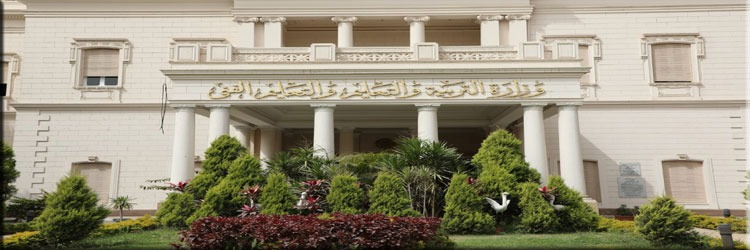Education signs a joint cooperation protocol with the Ministry of Communications and Information Technology to support the educational process for students with disabilities

The Ministry of Education and Technical Education and the Ministry of Communications and Information Technology signed a joint cooperation protocol on supporting and developing the inputs of the educational process to improve services provided to students with disabilities in the light of the directives of Dr. Tarek Shawky, Minister of Education and Technical Education.
Dr. Ahmed Daher, Deputy Minister of Education for Technological Development, stressed the concerted efforts and joint cooperation with all institutions to advance and upgrade the educational system. Providing the necessary support and assistance for persons with disabilities to facilitate their lives, and their participation and inclusion in society.
He pointed to the importance of this protocol, praising the efforts of the Ministry of Communications in serving the community in addition to supporting people with special needs, stressing the Ministry of Education's keenness to support students with disabilities, and its relentless pursuit to provide an inclusive educational climate.
For his part, Dr. Raafat Hendy, Deputy Minister of Communications and Information Technology for Infrastructure Affairs, welcomed the cooperation with the Ministry of Education and Technical Education, praising the joint efforts and projects to serve the Egyptian community, wishing for more cooperation in the future.
He stressed that the Ministry of Communications and Information Technology seeks to achieve cooperation and partnership with the Ministry of Education; To support the strategy of empowering and integrating persons with disabilities in various fields and activities that contribute to enhancing the participation and integration of this group within society.
This protocol aims to support the educational process by converting some curricula using modern technological applications (converting some curricula of the new education system to the speaking method for the blind), making the educational process available for students with disabilities using assistive technology, and developing teachers’ capabilities to raise the efficiency of the educational process, by training them on programs Specialized, quality programs, in addition to providing technological support to educational integration schools and community education schools.
The protocol also provides for the provision of technological support to (1,300) schools of inclusion, and (300) schools of community education, through the technological availability of curricula for students with disabilities within special education and inclusion schools, using assistive technology.
The protocol also includes developing the capabilities of teachers of integration and special education, by preparing and approving a training package for teachers to qualify them to apply the science and technology approach (STEM), and preparing and approving a training package to develop teachers’ technological capabilities, to use and apply communication and information technology tools, as well as preparing and approving a number of (5) portfolios. Specialized training.
The protocol also provides for the support and capacity-building of teachers, through the training of 100,000 employees in schools of special education, intellectual education, integration schools, community education schools, and departments and departments of the gifted and smart learning.
It is worth noting that this protocol comes within the framework of supporting and empowering persons with disabilities using information and communication technology; In light of the fruitful cooperation between the two ministries to develop the educational process for persons with disabilities; Where it was under previous cooperation between the two ministries; Supporting 810 schools of special education and inclusion, and developing the technological and specialized capabilities of nearly 30,000 teachers.
The signing of the protocol was attended by Dr. Hala Abdel Salam, head of the Central Administration for Special Education Affairs and the supervisor of the central administration of kindergartens and basic education, Dr. Abdel Moneim El Sharkawy, President of the National Academy of Information Technology for Persons with Disabilities, and Dr. Alaa Sabra, Training Officer in the Executive Council of the National Academy of Information Technology for People with Disabilities.
More about signs
